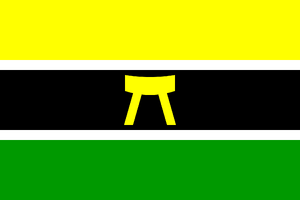Cultures:Asante
Asante
 | |
| Caption | Flag of the Ashanti |
|---|---|
| Name | Asante/Ashanti |
| Region | Ghana |
| Languages | Twi |
| Religions | Akan, Christianity, Islam |
Summary
The Asante, also known as Ashanti in English (/əˈʃɑːntiː/ ⓘ), are part of the Akan ethnic group and are native to the Ashanti Region of modern-day Ghana. Asantes are the last group to emerge out of the various Akan civilizations. Twi is spoken by over nine million Asante people as their native language.
 | |
| Caption | Flag of the Ashanti |
|---|---|
| Name | Asante/Ashanti |
| Region | Ghana |
| Languages | Twi |
| Religions | Akan, Christianity, Islam |
Geography
The Ashanti Region has a variable terrain: coasts and mountains; wildlife sanctuary, strict nature reserve, and national parks; forests and grasslands;[7] lush agricultural areas;[8] and near savannas,[7] enriched with vast deposits of industrial minerals,[8] most notably vast deposits of gold.[9]
The territory Asante people settled is home to a volcanic crater lake, Lake Bosumtwi, and Asante is bordered westerly to Lake Volta within the central part of present-day Ghana.[10] The Asante (Kingdom of Asante) territory is densely forested, mostly fertile and to some extent mountainous.[10] There are two seasons—the rainy season (April to November) and the dry season (December to March).[10] The land has several streams; the dry season, however is extremely desiccated.[10] Ashanti Region is hot year round.[10]
Today Asante people number upwards of 10 million. Asante Twi, the majority language, is a member of the Central Tano languages within the Kwa languages.[1][11] Asante political power combines Asantehene Otumfuo Nana Osei Tutu II as the political head of the Asantes and the Ashanti Region,[12][13] with Asante semi-one-party state representative New Patriotic Party,[14] and since the Ashanti Region (and the Kingdom of Asante) state political union with Ghana,[15] the Asante remain largely influential.[16]
Asantes reside in Asante and Brong Ahafo Regions in Ghana.[16] Kumase metropolis, the capital of Asante (Kingdom of Asante), has also been the historic capital of the Asante Kingdom.[16] The Ashanti Region currently has a population of 11 million (11,000,000).
Today, as in the past, the Ashanti Region continues to make significant contributions to Ghana's economy.[17] Asante is richly endowed with industrial minerals and agricultural implements, Asante is responsible for much of Ghana's domestic food production and for the foreign exchange Ghana earns from cocoa, agricultural implements, gold, bauxite, manganese, various other industrial minerals, and timber.[17] Kumase metropolis and Ashanti Region produces 96% of Ghana's exports.[8][9]
History
In the 1670s the Ashanti went from being a tributary state to the centralized hierarchical Denkyira kingdom. Asantehene Osei Kofi Tutu I, military leader and head of the Oyoko clan, founded the Asante kingdom. Osei Tutu obtained the support of other clan chiefs and using Kumase as the central base, subdued surrounding states.[6] Osei Tutu challenged and eventually defeated Denkyira in 1701,[4][6] and presumptuously from this, the name Asante came to be.[4][6]
Realizing the weakness of a loose confederation of Akan states, Osei Tutu strengthened centralization of the surrounding Akan groups and expanded the powers judiciary system within the centralized government.[18] Thus, this loose confederation of small city-states grew into a kingdom or empire looking to expand its land.[18] Newly conquered areas had the option of joining the empire or becoming tributary states.[18] Opoku Ware I, Osei Tutu's successor, extended the borders.[19]
Languages
Twi ([tɕᶣi]) is a variety of the Akan language spoken in southern and central Ghana by several million people, mainly of the Akan people, the largest of the seventeen major ethnic groups in Ghana. Twi has about 4.4 million speakers.[1]
Twi is a common name for mutually intelligible former literary dialects of the Akan language of Bono, Asante and Akuapem.[2][3][4] Akuapem, as the first Akan variety to be used for Bible translation, has become the prestige dialect as a result.[5] It is also spoken by the people of southeastern Côte d'Ivoire.[6][3][7] It generally subsumes the following dialects: Ahafo, Akuapem, Akyem, Asante, Asen, Dankyira and Kwawu.[8]
Religions
The Asante follow Akan religion and the Asante religion (a traditional religion which seems to be dying slowly but is revived only on major special occasions—yet is undergoing a global revival across the diaspora), followed by Christianity (Roman Catholicism and Protestantism) and Islam.[38]
Asante people received the religion of Islamic North Africa within their talismanic tradition, making amulets with Quranic citations, name of the Arabic angels or Jinn. Amulets were also set in the corners of houses or soaked in water to produce liquids for drinking and for washing that were believed to have thaumaturgical properties.[39]
Traditions & Customs
Asante are a matrilineal society where line of descent is traced through the female.[27] Historically, this mother progeny relationship determined land rights, inheritance of property, offices and titles.[27] It is also true that the Asante inherit property from the paternal side of the family.[27]
Asante soulwasher (Ashanti Sunsum Washer) Though not considered as important as the mother, the male interaction continues in the place of birth after marriage.[27]
Historically, an Asante girl was betrothed with a golden ring called "petia" (I love you), if not in childhood, immediately after the puberty ceremony.[27] They did not regard marriage "awade" as an important ritual event, but as a state that follows soon and normally after the puberty ritual.[27] The puberty rite was and is important as it signifies passage from childhood to adulthood in that chastity is encouraged before marriage.[27] The Asante required that various goods be given by the boy's family to that of the girl, not as a 'bride price', but to signify an agreement between the two families.[27]